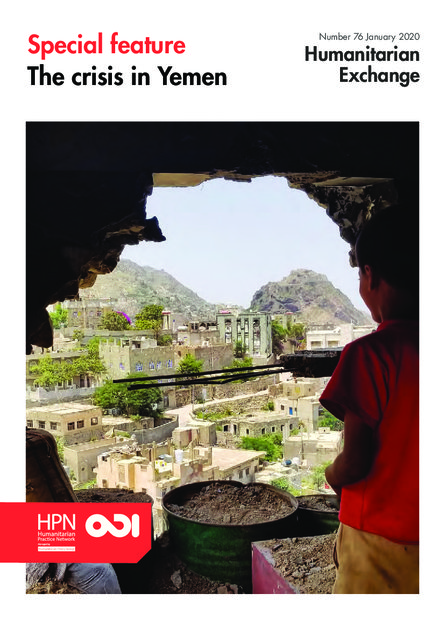
This edition of Humanitarian Exchange focuses on the crisis in Yemen. Since the war there began in 2014, thousands of civilians have been killed or injured and air strikes and ground operations have destroyed hospitals, schools and critical infrastructure. An estimated 80% of Yemenis need humanitarian assistance.
In the lead article, Laurie Lee highlights the critical role Yemenis and Yemeni organisations are playing in addressing the humanitarian challenges in the country, and how NGOs can better support them. Genevieve Gauthier and Marcus Skinner reinforce this point with reference to two local organisations, the Yemen Women’s Union and Al Hikma. Warda Saleh, the founder of another Yemeni grassroots organisation, discusses the increased risk of gender-based violence facing women and girls, while Ibrahim Jalal and Sherine El Taraboulsi-McCarthy focus on internal displacement and the opportunities for a more effective humanitarian response. Reflecting on child protection programming in Yemen, Mohammed Alshamaa and Amanda Brydon conclude that multisectoral approaches with local authorities result in better and more sustainable outcomes. Padraic McCluskey and Jana Brandt consider the ethical dilemmas Médecins Sans Frontières (MSF) faced in trying to balance quality and coverage in a mother and child hospital in Taiz. Lindsay Spainhour Baker and colleagues reflect on the challenges involved in gathering and analysing information on the humanitarian situation while Lamis Al-Iryani, Sikandra Kurdi and Sarah Palmer-Felgate discuss the findings from an evaluation of the Yemen Social Fund for Development (SFD) Cash for Nutrition programme. An article by Kristine Beckerle and Osamah Al-Fakih details Yemeni and international organisations’ efforts to document and mitigate harm to civilians caught up in the conflict. The edition ends with a piece by Fanny Pettibon, Anica Heinlein and Dhabie Brown outlining CARE’s advocacy on the arms trade.
Finally, readers will note that this edition is shorter than usual, largely because it was very difficult to persuade potential authors to write on the Yemen crisis. Many of the individuals and organisations we contacted were either too busy responding or were concerned that writing frankly about their work could negatively affect their operations. HPN has covered many similarly sensitive contexts in Humanitarian Exchange over the last 26 years, but this is the first time we have experienced such reluctance to engage. A worrying sign.
